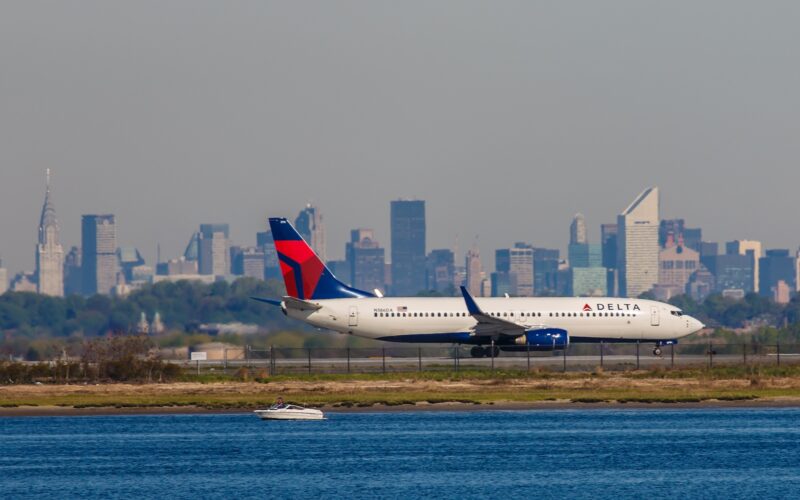NTSB releases preliminary report on AA/Delta JFK runway incursion

The United States (US) National Transportation Safety Board (NTSB) released a preliminary report on a runway incursion involving an American Airlines (AA) Boeing 777 and Delta Air Lines Boeing 737 at John F. Kennedy International Airport (JFK), New York, US.
On January 13, 2023, an American Airlines Boeing 777-200, registered as N754AN, crossed an active runway as it was taxiing to begin its take-off roll to depart on flight AA106 to London Heathrow Airport (LHR). The same runway was being used by a Delta Air Lines Boeing 737-900ER, registered as N914DU, which had begun its take-off roll.
The AA aircraft was cleared by Air Traffic Control (ATC) to cross runway 31L at taxiway K. However, the 777’s flight crew crossed runway 4L at taxiway J, where it proceeded to lineup to depart from runway 31L, which was inactive at the time. The Delta Boeing 737 was forced to abort its take-off attempt and subsequently, the narrowbody jet taxied to the gate.
No injuries were reported on either of the aircraft.
Separated by 1,400 feet
According to the NTSB’s report, the closest point between the two aircraft was about 1,400 feet (426 meters), occurring as the Delta jet decelerated past taxiway K4 and the AA 777 exited runway 4L at taxiway J.
ATC was alerted to the potential ground conflict by the Airport Surface Detection System — Model X (ASDE-X), which uses radar, multilateration, and satellite technology to track aircraft and vehicle movements on the ground at airports. Immediately after the ASDE-X system alerted ATC, the controller canceled the take-off clearance for the Delta 737.
The NTSB formed groups to investigate operational factors, human performance, ATC, and the flight data recorder (FDR) data. Due to current Cockpit Voice Recorder (CVR) limitations, CVR data from the incident was irretrievable due to being overwritten. The NTSB also involved the Federal Aviation Administration (FAA), Boeing, Delta Air Lines, American Airlines, Allied Pilots Association (APA), which represents AA pilots, and the National Air Traffic Controllers Association (NATCA).
On February 1, 2023, the board began interviewing the parties involved in the incident, starting with an audio-recorded interview with ATC.
Refusing to conduct recorded interviews
While the NTSB obtained data from FDRs on both aircraft and a recorded interview with the controllers present at the airport at the time of the incident, American Airlines pilots refused to conduct a recorded interview.
According to the investigators, they had attempted to interview the AA crew three times. The airline “cleared the flight crew’s schedule to ensure their availability; however, the flight crew refused to be interviewed on the basis that their statements would be audio recorded for transcription,” the NTSB noted in the report.
A representative of APA informed the board that the Boeing 777 pilots “would not consent to participate in audio recorded interviews in any manner”. However, the NTSB determined that the “investigation requires that the flight crew interviews be audio recorded and transcribed by a court reporter to ensure the highest degree of accuracy, completeness, and efficiency.”
The NTSB issued subpoenas for their testimony.
In response, APA released a statement on February 10, 2023, stating that while the union supports “the vital role played by the NTSB in investigating accidents and incidents in furtherance of its mission to promote safety in aviation”, APA believes the “introduction of electronic recording devices into witness interviews is more likely to hinder the investigation process than it is to improve it.” Historically, according to the association, notes and stenographic records were enough for the NTSB to conduct its investigations.
“Not only may the recording of interviews lead to less candid responses from those witnesses who may choose to proceed under such requirements, but the existence and potential availability of interview recordings upon conclusion of an investigation will tend to lead many otherwise willing crew members to elect not to participate in interviews at all,” APA continued. As such, the union considers that neither of those outcomes would benefit investigations and, subsequently, aviation safety.
“We are confident that an acceptable solution to this issue exists that would satisfy the needs and concerns of all parties involved in these investigatory interviews,” the American Airlines pilot union concluded.
Meanwhile, the Delta Air Lines Boeing 737 pilots produced written statements, with the NTSB commenting that “their statements contain sufficient information” for the investigation, the board noted in its statement on February 10, 2023. The NTSB also pointed out that it “offered to both procure a court reporter to produce a verbatim transcript of the interviews and provide the opportunity for each crew member to review the interview transcripts”, but the AA flight crew still refused its offer.
Additionally, the NTSB reiterated that it recommended the FAA require passenger airlines to have CVRs capable of recording 25 hours of audio, replacing the current two-hour recording.
